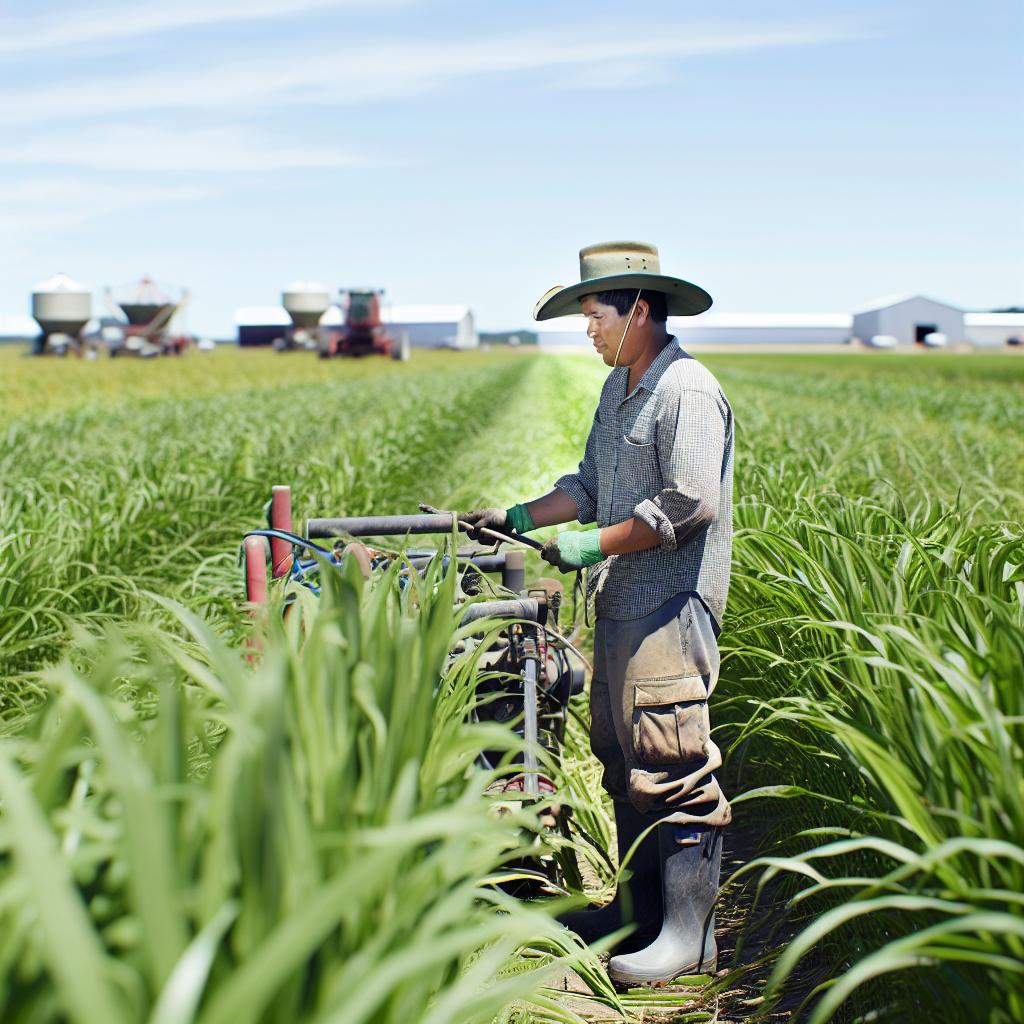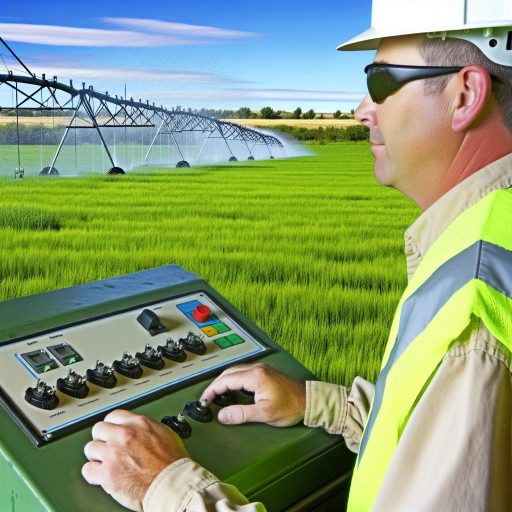Introduction:
An agricultural technician is a professional who assists farmers in various agricultural tasks.
Agricultural technicians play a crucial role in ensuring the success and efficiency of farming operations.
Responsibilities of an Agricultural Technician:
- Soil testing and analysis to determine nutrient levels and composition.
- Monitoring crop growth and health to identify any issues or diseases.
- Assisting in the application of fertilizers, pesticides, and herbicides.
- Operating and maintaining farm equipment such as tractors and harvesters.
- Conducting research on new farming techniques and technologies to improve productivity.
- Providing recommendations to farmers on crop rotation and soil management practices.
Skills and Qualifications Required:
- Knowledge of agricultural principles, practices, and techniques.
- Strong analytical and problem-solving skills to address various farming challenges.
- Ability to work outdoors in different weather conditions.
- Excellent communication skills to collaborate with farmers and other agricultural professionals.
- Education in agriculture, agronomy, or a related field is often required for this role.
Importance of Agricultural Technicians:
Agricultural technicians are essential members of the farming industry, supporting farmers and contributing to sustainable agriculture practices.
Their expertise and dedication help to ensure the success and profitability of agricultural operations.
Education and Training Requirements of an Agricultural Technician
One of the basic requirements to become an agricultural technician is obtaining an Associate’s degree in agricultural technology or a related field.
This provides a solid foundation of knowledge and skills necessary to excel in this profession.
On-the-Job Training and Certifications
In addition to formal education, on-the-job training is often required for agricultural technicians to gain hands-on experience in the field.
Certifications may also be necessary to demonstrate competency in specific areas.
Continuous Learning and Professional Development
As agriculture is a constantly evolving industry, agricultural technicians must engage in continuous learning and professional development.
This helps them stay current with the latest technologies, techniques, and trends.
Attending workshops, seminars, and conferences may also be involved.
Professional organizations such as the American Society of Agronomy and the Soil Science Society of America offer various resources and opportunities for agricultural technicians.
This enables them to enhance their knowledge and skills.
Role of an Agricultural Technician in the Field:
When it comes to the role of an agricultural technician, there are several key responsibilities that they perform on a daily basis.
These tasks are essential for ensuring the success and efficiency of agricultural operations.
Conducting Soil and Crop Research:
- Collecting soil samples for analysis
- Conducting field experiments to test new crops
- Analyzing data to make recommendations for crop yield improvement
Implementing and Monitoring Pest Control Programs:
- Developing pest management plans
- Applying pesticides and other control methods
- Monitoring pest populations and effectiveness of treatments
Maintaining and Repairing Agricultural Machinery and Equipment:
- Performing routine maintenance on tractors and implements
- Repairing equipment breakdowns in a timely manner
- Keeping accurate records of maintenance and repairs
Assisting with Planting, Harvesting, and Irrigation Processes:
- Preparing fields for planting
- Operating harvesting machinery during the harvest season
- Monitoring irrigation systems for proper water distribution
Overall, the role of an agricultural technician is crucial for the success of modern agriculture.
They play a vital role in ensuring that crops are grown efficiently and sustainably.
Additionally, they maintain the health of the soil and environment.
Learn More: Understanding the Role of an Animal Nutritionist
Duties of an agricultural technician in a laboratory setting:
– Analyzing soil and crop samples for nutrient levels
Transform Your Career Today
Unlock a personalized career strategy that drives real results. Get tailored advice and a roadmap designed just for you.
Start Now– Conducting experiments to improve crop yields and quality
– Testing new pesticides and fertilizers for effectiveness and safety
In a laboratory setting, an agricultural technician plays a crucial role in ensuring the success of various agricultural projects.
The duties of an agricultural technician in a laboratory setting are diverse and vital for the advancement of agriculture.
Let’s delve deeper into the specific responsibilities of an agricultural technician in this environment.
Analyzing soil and crop samples for nutrient levels
One of the primary duties of an agricultural technician in a laboratory setting is to analyze soil and crop samples to determine their nutrient levels.
This analysis is essential for farmers as it helps them understand the fertility of their soil and the nutritional status of their crops.
By conducting these analyses, agricultural technicians provide valuable information that can guide farmers in making informed decisions regarding fertilization and crop management strategies.
Conducting experiments to improve crop yields and quality
Agricultural technicians are tasked with conducting experiments in the laboratory to find ways to improve crop yields and quality.
These experiments often involve testing different agricultural techniques, technologies, or products to determine their impact on crop productivity and quality.
By conducting these experiments, agricultural technicians contribute to the development of innovative solutions that can help farmers maximize their yields and produce high-quality crops.
Testing new pesticides and fertilizers for effectiveness and safety
In addition to analyzing soil and crop samples, agricultural technicians are responsible for testing new pesticides and fertilizers in the laboratory to assess their effectiveness and safety.
This testing is crucial to ensure that farmers have access to reliable and safe agricultural inputs that can help protect their crops from pests and improve their growth.
By testing these products, agricultural technicians play a key role in ensuring the sustainability and success of agricultural practices.
Overall, the duties of an agricultural technician in a laboratory setting are diverse and essential for the advancement of agriculture.
From analyzing soil and crop samples to conducting experiments and testing new pesticides and fertilizers, agricultural technicians play a critical role in ensuring the success of various agricultural projects.
Their work provides valuable insights and solutions that contribute to the improvement of crop productivity, quality, and sustainability.
Gain More Insights: Effective Communication for Pest Control Advisors
Importance of Data Collection and Analysis in the Work of an Agricultural Technician:
As an agricultural technician, one of the key aspects of the job is data collection and analysis.
This process is crucial for managing and improving agricultural practices.
Transform Your Career Today
Unlock a personalized career strategy that drives real results. Get tailored advice and a roadmap designed just for you.
Start NowHere are some reasons why data collection and analysis are essential in the work of an agricultural technician:
Recording and Organizing Data on Crop Yields, Soil Quality, and Pest Infestations:
- Accurate data on crop yields helps track productivity and identify areas for improvement.
- Information on soil quality guides decisions on fertilizer application and soil management practices.
- Monitoring pest infestations allows for timely interventions to prevent crop damage.
Analyzing Data to Identify Trends and Make Recommendations for Improvement:
- By analyzing data, agricultural technicians can detect patterns and trends that may go unnoticed.
- Identifying trends helps in predicting future outcomes and making informed decisions.
- Recommendations based on data analysis lead to more effective farming practices.
Using Data to Develop and Implement Sustainable Farming Practices:
- Data-driven decision-making promotes sustainability by reducing waste and optimizing resources.
- Information on weather patterns and climate change can inform adaptations to farming practices.
- Sustainable practices based on data analysis improve long-term soil health and crop resilience.
Data collection and analysis play a vital role in the work of an agricultural technician.
It is through data that informed decisions are made, leading to improved crop yields, sustainable farming practices, and overall success in agriculture.
Delve into the Subject: Irrigation Specialist: Continuing Education and Training
Collaboration with Farmers and Agricultural Scientists:
Working closely with farmers to implement research findings and best practices.
Collaborating with agricultural scientists to develop new technologies and techniques.
Providing expertise and support to help farmers increase productivity and profitability.
Collaboration with farmers is a crucial aspect of an agricultural technician’s role.
By working closely with farmers, technicians can help implement research findings and best practices on the ground.
This hands-on approach allows for the effective application of new technologies and techniques in real-world agricultural settings.
Furthermore, agricultural technicians collaborate with agricultural scientists to develop innovative solutions to pressing challenges facing the agriculture industry.
By combining their expertise and knowledge, technicians and scientists can create new technologies and techniques that improve agricultural productivity and sustainability.
One of the key responsibilities of an agricultural technician is to provide expertise and support to farmers.
By sharing their knowledge and experience, technicians can help farmers increase their productivity and profitability.
This support may include advising on crop selection, pest control strategies, irrigation techniques, and other aspects of agricultural management.
Collaboration with farmers and agricultural scientists is an essential part of an agricultural technician’s role.
By working together, technicians, farmers, and scientists can develop and implement innovative solutions that benefit the agriculture industry as a whole.
Gain More Insights: Innovative Irrigation Techniques for Farm Efficiency

Use of Technology in the Work of an Agricultural Technician:
Utilizing GPS systems for precision farming.
Using drones to monitor crop health and irrigation needs.
Transform Your Career Today
Unlock a personalized career strategy that drives real results. Get tailored advice and a roadmap designed just for you.
Start NowIncorporating data management software for record-keeping and analysis.
Technological advancements have greatly impacted the work of agricultural technicians.
The integration of technology has revolutionized the way agricultural practices are carried out.
One of the key technologies that agricultural technicians now rely on is GPS systems for precision farming.
GPS systems allow agricultural technicians to accurately determine the location of fields.
This technology enables technicians to optimize planting patterns and monitor crop growth with precision.
By using GPS systems, agricultural technicians can maximize yield while minimizing input costs such as fertilizers and pesticides.
Using these systems ensures that resources are used efficiently and sustainably.
In addition to GPS systems, drones have become invaluable tools for agricultural technicians.
Drones equipped with specialized sensors provide real-time data on crop health, moisture levels, and irrigation needs.
Agricultural technicians can use this data to make informed decisions about when and where to apply fertilizers or pesticides.
This leads to more targeted and effective treatments.
Furthermore, data management software has become essential for agricultural technicians to keep track of field conditions, crop yields, and other important data.
These software programs allow technicians to store, analyze, and visualize data.
This makes it easier to identify trends and make data-driven decisions.
Incorporating data management software into their work helps agricultural technicians improve productivity and efficiency.
The use of technology in the work of agricultural technicians has transformed the industry.
This transformation has made agriculture more efficient, precise, and sustainable.
As technology continues to advance, agricultural technicians must stay updated on the latest tools and techniques.
This is essential to remain competitive and meet the growing demands of modern agriculture.
Transform Your Career Today
Unlock a personalized career strategy that drives real results. Get tailored advice and a roadmap designed just for you.
Start NowChallenges Faced by Agricultural Technicians
Agricultural technicians play a crucial role in the agricultural sector.
However, they also face numerous challenges in their line of work.
Some of the key challenges they encounter include:
Changing Weather Patterns and Climate Conditions
One of the major challenges that agricultural technicians face is the unpredictability of weather patterns.
Climate change is becoming a reality.
Farmers often face extreme weather events such as droughts, floods, and hurricanes.
Agricultural technicians must adapt and develop strategies.
They help farmers mitigate the effects of these weather variations.
Pest and Disease Outbreaks that Require Swift Intervention
Pest and disease outbreaks can have a devastating impact on crop yields and livestock production.
Agricultural technicians must be on the lookout for signs of infestations and diseases.
They take swift action to prevent the spread and minimize damage.
Technicians work closely with farmers to implement integrated pest management strategies.
They also deploy disease control measures to safeguard crops and livestock.
Balancing the Need for Increased Productivity with Environmental Sustainability
As the global population continues to grow, there is a growing demand for increased food production.
However, agricultural technicians face the challenge of balancing the need for higher productivity.
They must also consider the importance of sustainability.
They need to find ways to increase yields while minimizing negative impacts on the environment.
This includes reducing water usage, minimizing chemical inputs, and promoting biodiversity on farms.
Agricultural technicians play a critical role in helping farmers adapt to the changing agricultural landscape.
They ensure the long-term sustainability of the industry.
Transform Your Career Today
Unlock a personalized career strategy that drives real results. Get tailored advice and a roadmap designed just for you.
Start NowDespite the challenges they face, their expertise and dedication are essential for the future of agriculture.
Role and Duties of an Agricultural Technician
Agricultural technicians assist in research, collection and analysis of data on crops and animals.
They provide support to farmers in implementing best practices for crop production and animal husbandry.
Agricultural technicians also assist in monitoring the health and growth of crops and animals.
They are responsible for maintaining equipment and tools used in agriculture.
Agricultural technicians help in conducting experiments to improve crop yields and animal health.
They may work in laboratories, greenhouses, farms, and other agricultural settings.
Agricultural technicians play a crucial role in promoting sustainable farming practices.
Importance of Agricultural Technicians
Agricultural technicians are vital in supporting sustainable farming practices and improving food security.
They assist farmers in research, implementation of best practices, and monitoring crop and animal health.
The role of agricultural technicians is essential for the advancement of agriculture and ensuring food sustainability.
Additional Resources
[E-Books for Sale]
The Big Book of 500 High-Paying Jobs in America: Unlock Your Earning Potential
$19.99 • 500 High-Paying Jobs • 330 pages
Explore 500 high-paying jobs in America and learn how to boost your career, earn more, and achieve success!
See All 500 High-Paying Jobs of this E-Book
1001 Professions Without a Degree: High-Paying American Jobs You Can Start Now
$19.99 • 1001 Professions Without a Degree • 174 pages
Discover 1001 high-paying jobs without a degree! Unlock career tips, skills, and success strategies for just $19.99!




